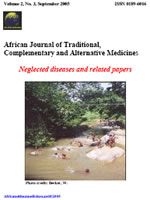
|
African Journal of Traditional, Complementary and Alternative Medicines
African Ethnomedicines Network
ISSN: 0189-6016
Vol. 5, No. 3, 2008, pp. 257-262
|
 Bioline Code: tc08036
Bioline Code: tc08036
Full paper language: English
Document type: Review Article
Document available free of charge
|
|
|
African Journal of Traditional, Complementary and Alternative Medicines, Vol. 5, No. 3, 2008, pp. 257-262
| en |
Anti-Nociceptive And Anti-Inflammatory Effects Of A Nigerian Polyherbal Tonic Tea (PHT) Extract In Rodents
Oluwatoyin, Agbaje Esther; Adewale, Adeneye Adejuwon & Isaac, Adeleke Tijani
Abstract
The study investigated the anti-nociceptive and anti-inflammatory properties of a Nigerian Polyherbal Health Tonic tea aqueous extract (PHT) in rodents of both sexes. 100 - 500 mg kg–1 of the aqueous extract was administered via the intra-peritoneal (i.p.) and oral (p.o.) routes to 5 groups of mice using tail immersion, tail clip, formalin and acetic acid –induced writhing tests of experimental nociceptive models. Each of the models showed that PHT possesses a significant (p<0.05) anti-nociceptive effects which were peripherally and centrally mediated as both the early and late phases of pain significantly (p<0.05) were inhibited. However, the peripherally mediated analgesic effect of PHT, although similar to that of aspirin but was found to be more potent than aspirin. In assessing its anti-inflammatory potentials, 300 - 1340 mg kg–1 PHT was also administered via oral and intraperitoneal routes, which, significantly (p<0.05) reduced the volume of carrageenan-induced oedema. Although, PHT administered via i.p. route was more effective than the oral but there was barely any difference between the percentage inhibition of oedema volume at both 600 and 1340 mg kg-1 given orally. PHT anti-inflammatory effect was elucidated to be significantly (p<0.05) mediated via histaminergic, serotonergic, bradykinin and prostaglandin inhibition. PHT was also shown to be more protective than acetylsalicylic acid (ASA) in the castor oil-induced diarrhea model, which suggests the involvement of other mechanisms. Thus, lending supports to its folkloric use in pain and swelling management.
Keywords
Polyherbal Health Tonic tea (PHT), Anti-nociception, Anti-inflammation; Oral and intraperi- toneal routes, Rodents
|
| |
© Copyright 2008 - African Journal Traditional, Complementary and Alternative Medicines
Alternative site location: http://journals.sfu.ca/africanem/index.php/ajtcam
|
|
